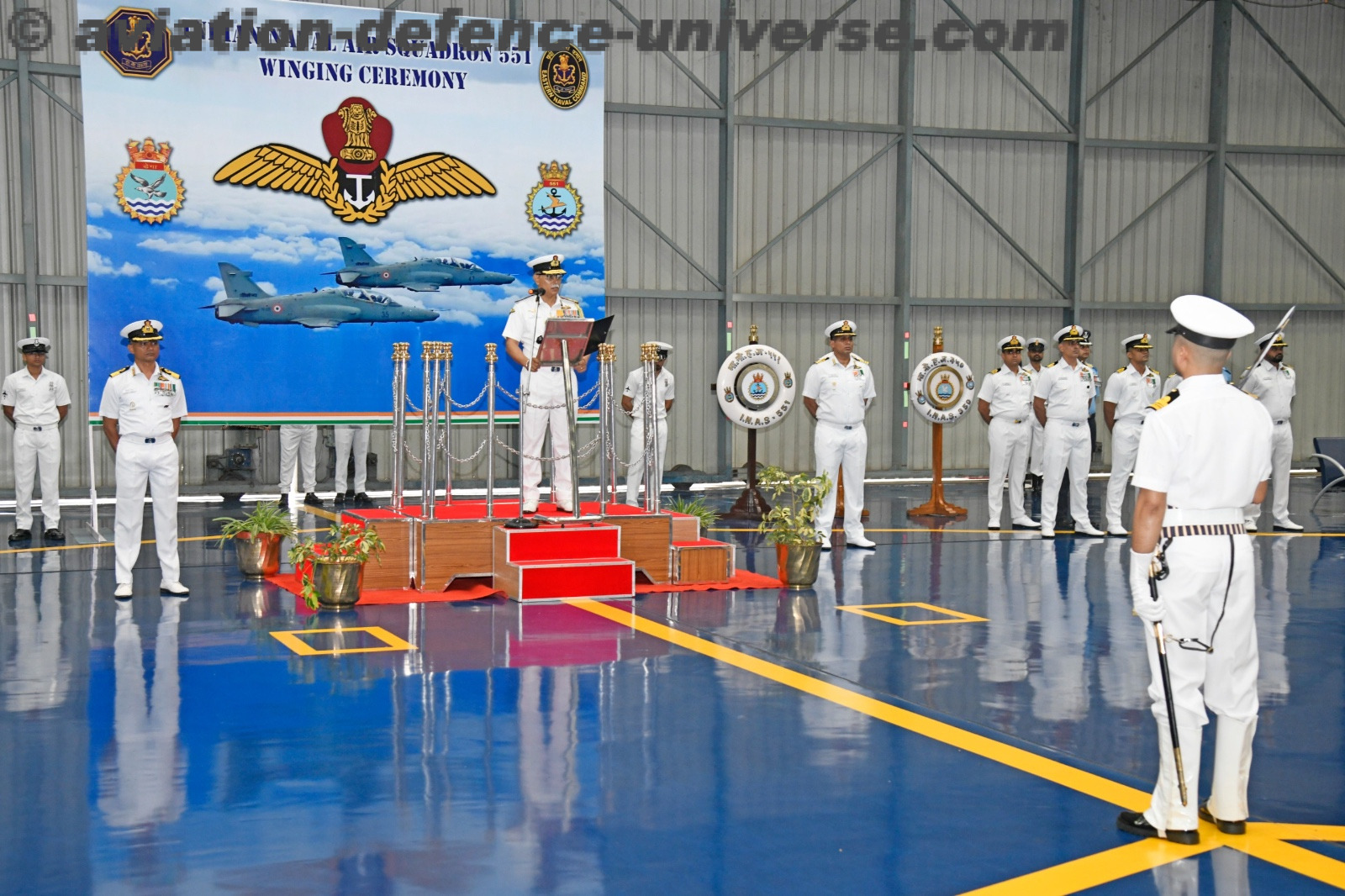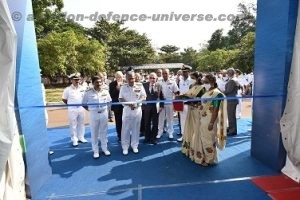New Delhi. 28 September 2021. Global Counterterrorism Council (GCTC), an international think tank based in New Delhi, in line with the vision of Prime Minister of India Narendra Modi of Securing India and in memory of Global Counter Terrorism Council (GCTC) Member Maj Gen Raj Krishan Malhotra, AVSM, VSM (Retd.), GCTC had organized a three day conference on Secure India 2.0: Strategic Infrastructure and Border Development, that successfully probed into the intricacies of border guarding, border management and strategic infrastructure; how they have evolved and the capability of the authorities to meet the future challenges that might arise.
The conference was spaced over three days and further bifurcated into 1 key note session and 10 panel discussions. The conference dealt with important aspects of strategic infrastructure and border development, which included:
- External security challenges at the borders, response of other countries and solutions.
- Internal security challenges at land borders
- China policy of encircling India and counter measures.
- New technological challenges at the borders like drone attack-surveillance by enemy, use of modern technology: social media etc.
- Strategy and Long-Term Perspectives of Infrastructure Development in Border Areas; Achievements & Landmarks.
- Challenges, Strategy and Vision of Coastal & Maritime Security.
- Countering internal security challenges at the borders
The conference was preceded by an inaugural session wherein Dr. Yogendra Narain, Former Defence Secretary of GoI, had rightly pointed out the technological changes along the borders such as bullet proof bunkers which are modular and portable, which proves to be important along the LOC and LAC in case of ceasefire violations. Prakash Singh, Former DG BSF had highlighted the phenomenal strategic infrastructure development in Punjab and equated it to cutting off the oxygen supply to terrorism.
Dr. Shekar Dutt, Former Defence Secretary of GoI, had highlighted the importance of surveillance and noted “The best way to secure the borders Is to know what is happening On the other side. And the Technology provides that opportunity with different forms of technology like The satellites and the other forms of surveillance.
In remembering Major Gen Raj Krishan Malhotra, Mrs Veenakshi Malhotra (wife), Dr.Gurbeen Malhotra (Brother), Maj Gen Raj Krishan Malhotra (brother) and the son of Maj Gen Raj Krishan Malhotra in unison had highlighted the major’s dedication to the services and the country.
The first day began with a case study presented by Lt Col Guermantes Lailari, Former USAF Foreign Area Officer on the challenges faced by Israel at its borders. He drew parallels to the 26/11 Mumbai attack and had stated that “The series of 1993 Attacks in New York City were connected with India as the same attacks were replicated in Mumbai. Terrorists use history for the attacks. Borders cannot be sealed, they ought to be opened for trade and commutation and these secret groups take the advantage of the opened borders.”
This was followed by a panel discussion on Historical perspectives of borders including the coastal areas chaired by Col DPK Pillay. The panel consisted of eminent speakers like, Maj Gen Ashwani Siwach, YSM VSM** Former Head of Territorial Army; Commodore Anil Jai Singh, Navy Veteran; Lt Gen Shokin Chauhan, Former Chairman-Cease Fire Monitoring Group, MHA, GoI & Former DG-Assam Rifles; PS Papta, IPS, IG, ITBP and Sanjiv Krishan Sood, IPS, Former ADG-BSF. All the speakers reflected on the history of the borders and the establishment of the border guarding forces. Looking to the present they had also deliberated on the challenges present at these borders.
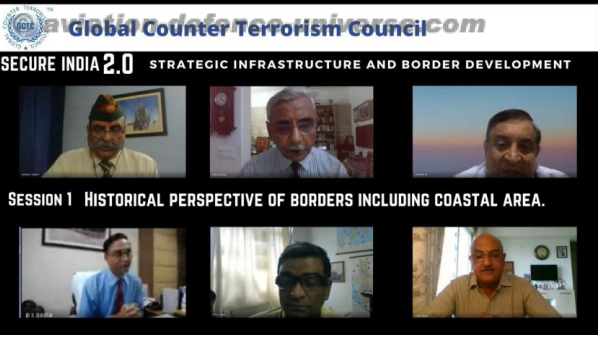
The second panel discussion was on the External security challenges at the borders and the response of other countries and solutions was chaired by Prabha Rao, IPS (Retd), Special Secretary, Cab. Sect., GoI. The panel consisted of eminent speakers like, Dr. Kanwal Sibal, IFS(Retd), Chairman, Advisory Board & Former Foreign Secretary, GoI; Gen Daya Ratnayake, WWV, RWP, RSP, USP, Secretary, Ministry of Industries & Former Chairman-Sri Lanka Ports Authority & Former Commander, SriLankan Army; Lt Gen Philip Campose, PVSM, AVSM, VSM, Former Vice Chief of Army Staff & Former GOC-in-C, Western Army Command, Indian Army; Lt Gen K.J. Singh, PVSM, AVSM & Bar, Former GOC-in-C, Western Army Command, Indian Army; Maj Gen Abdur Rashid, Executive Director of Institute of Conflict, Law and Development Studies, Bangladesh; Dr. Rakesh Datta, Department of Defence and National Security Studies, Panjab University; Dr. Pavithran Nambiar, Senior Faculty, School of Police Science & Security Studies, NFSU. All the speakers while presenting their opinios on the challenges faced at the eastern and western borders of India, had agreed that every border differs in its topography and has its beraing on the socio cultural composition of the society living on the borders. Thus traditional border management elemnets must be replaced with flexible and dynamic elements to guard and
manage the borders.
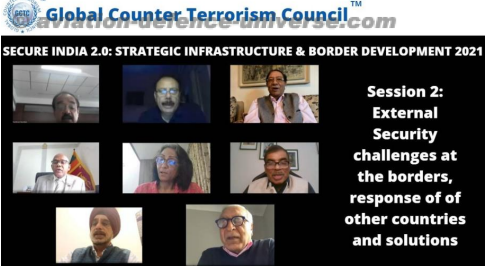
The third panel discussion was on the Internal security challenges at the land borders with emphasis on the border managent along Pakistan, Bangladesh, Nepal and Bhutan, with Lt Gen K.J. Singh, PVSM, AVSM & Bar, Former GOC-in-C, Western Army Command, Indian Army as the session chair. The panel consisted of eminent speakers like Anil Shukla, IPS, ADGP, Andaman; Avinash Mohnaney, IPS(Retd), Former DGP-Sikkim & Former Special Director,Intelligence Bureau; Brigadier Kapil Dev Malhotra, Defence Analyst; Sanjiv Krishan Sood, IPS, Former ADG-BSF; Prof Anshu Joshi, Assistant Professor, Jawaharlal Nehru University. All the speakers while candidly addressing the challenges faced along the LAC and LOC, agree that the significance of technology has jumped by leaps and bounds. While India needs technological advances to counter the challenges posed by drones but such technology should also be user friendly.
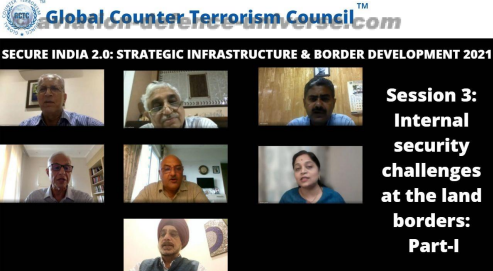
The second day began with a panel discussion on the Internal security challenges at the land borders with emphasis on the Indo-China border management by ITBP and the challenges faced along the Indo-Myanmar border with, Lt Gen Arun Sahni, PVSM, UYSM, SM, VSM Former General Officer Commanding in Chief, Indian Army as the session chair. The panel consisted of eminent speakers like Lt Gen Pradeep Chandran Nair, AVSM, YSM, Director General, Assam Rifles; GK Pillai, IAS(Retd), Former Home Secretary, GoI; Prof. Sanjoy Hazarika, Director-CSRI & Managing Trustee-Centre for North East Studies; Lt Gen Shokin Chauhan, PVSM, AVSM, YSM, SM and VSM, Former Chairman-Cease Fire Monitoring Group, MHA, GoI & Former DG-Assam Rifles and Brigadier Kapil Dev Malhotra, Defence Analyst. All the speakers highlighted that Myanmar is not only a country that has border with India but described it as a gateway to the south east asia. The challenges along the borders of Arunachal Pradesh and Myanmar are owing to the local insurgencies and managing infiltrations along Arunachal Pradesh. However, Prof. Sanjoy Hazarika, Lt Gen Shokin Chauhan and Brigadier Kapil Dev Malhotra had highlighted that the border management must not only be looked through the lens of geopolitics but must also take into consideration the cultural aspects of the people living in those areas (by highlighting that the case of racial discrimination of North Eastern people faced in India).
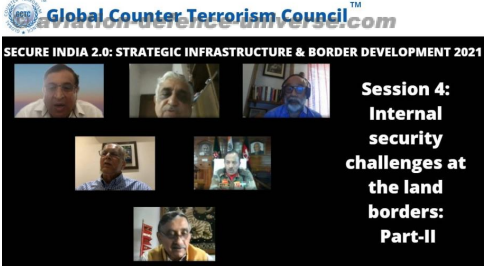
The fifth panel discussion was on the China’s policy of encircling India and measures to counter them with emphasis on the challenges posed by the BRI and China’s infrastructure build-up along Ladakh-Xijing border, with Cleo Paskal, Advisor-GCTC & Non Resident Fellow, F.D.D, USA as the session chair. The panel consisted of eminent speakers like Prof Srikant Kondapalli, Centre for East Asian Studies, School of International Studies, Jawaharlal Nehru University; Prof Madhav Das Nalapat, UNESCO Chair for Peace & Geopolitics Expert; Maj Gen Binoj Basnyat, Defence Ananlyst, Nepal; Prof Mahesh Ranjan Debata, Assistant Professor, Centre for Inner Asian Studies, School of International Studies, Jawaharlal Nehru University and Air Commodore K.R. Thaakar, Dean, School of Police Science & Security Studies, NFSU. All the speakers had highlighted that with
respect to tackling china, there are three elements that need to be considered: Investments, technology and defence.Furthermore, the speakers considered that Tibet will attract a lot of Politico-diplomatic attention with respect to Indo-China relations.
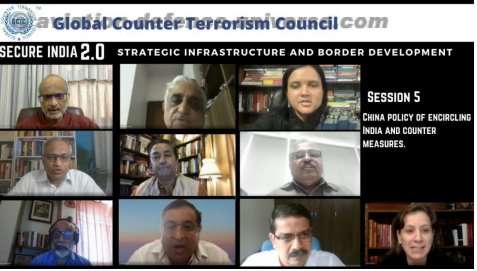
The Sixth panel discussion was on the New technological challenges at the borders like drone attack surveillance by enemy, use of modern technology with emphasis on the Air, space and satellite surveillance and monitoring and Drone and Anti Drone capabilities, which was chaired by Lt Gen (Dr.) AP Singh, Former DG Corps-Army Air Defence, Indian Army. The panel consisted of eminent speakers like Air Marshal Anil Chopra, DG-Centre for Air Power Studies; Brigadier RK Pandey, DDG PMO Suraj; Ashok Sharma, IPS(Retd), Former ADG, BSF; Michael Hopmeier, President of Unconventional Concepts, Inc., Virginia, USA; Dr. Keval Pandya, Asst. Professor, School of Police Science & Security Studies, NFSU; Maj P V Krishnan, Research Scholar,
Amity School of Defence & Strategic Studies and Dr. Charru Malhotra, Associate Professor, IIPA. The speakers while approaching the topic vide different perspectives on the technological requirements in order to tackle the dynamic changes in methods of warfare, had in unison highlighted that Using the Border Porosity index at various locations, Border infrastructure needs to be augmented. As manual border patrolling and satellite-based monitoring both have their own limitations Aerial Surveillance through Aerostats should be given due attention, as it offers the unique advantage of negligible RCS, no noise, 24X7 monitoring, and integrated control.
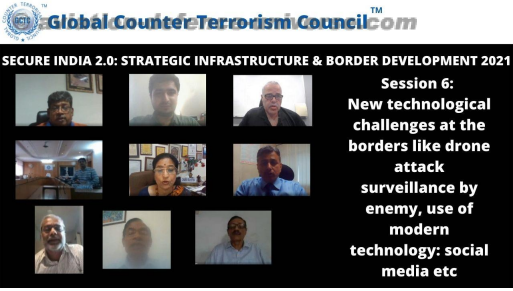
The seventh panel discussion was on the Strategy and Long Term Perspectives of Infrastructure Development in Border Areas which was chaired by Lt Gen Suresh Sharma, AVSM (Retd), Former Engineer In Chief & Former DG-Border Roads Organisation. The panel consisted of eminent speakers like Lt Gen Rajeev Chaudhary, Director General-Border Roads; Ranjit Singh, ADG(Border Wing), CPWD; Dr. B K Das, Outstanding Scientist & Director, IRDE, DRDO and Brigadier RK Pandey, DDG PMO Suraj. The speakers elucidated the technological feats that India is achieving. Dr.B K Das had highlighted that “IRDE is Currently developing a compact airborne multi-sensor,optronic payload. It is probably the world’s lightest payload with the highest sensors which is achieved at nearly 1/3rd of the costs.” However, the speakers expressed that the technology that is developed must acclimatise to the extreme weather conditions and must be user friendly as well.
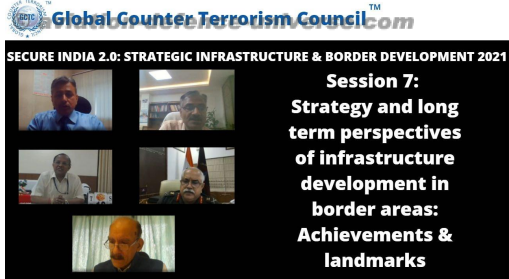
The third day began with a panel discussion on the Challenges, Strategy and Vision of Coastal & Maritime Security which was chaired by Vice Admiral Anil Chopra, PVSM, AVSM, Former FoC-in-C, Western Naval Command & Former FOC-in-C, Eastern Naval Command & Former DG-Indian Coast Guard. The panel consisted of eminent speakers like Rear Admiral Dalbir Singh Gujral, Assistant Chief of Naval Staff (Communications Space and Net-centric Operations) at Integrated Headquarters of MoD(Navy); Vice Admiral Pradeep Kaushiva, UYSM, VSM (Retd), Former Commandant, National Defence Collage & Former Director, National Maritime Foundation; KR Nautiyal, PTM, TM, Former ADG, Indian Coast Guard and Dr. Shubhamitra Das, Centre for Indo-Pacific Studies. School of International Studies, Jawaharlal Nehru University. The speakers had highlighted three main elements of coastal and maritime security: Marine Domain awareness and the significance of MDA, the scope of the term ‘maritime security’ and Indian ocean as a zone for peace. These elements require integrated planning, funding of schemes, advanced technology, and continuous exercises.
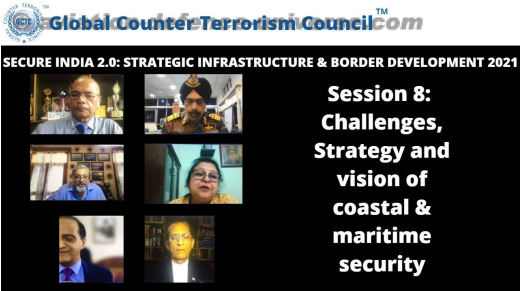
The ninth panel discussion was on Regulating inflow and outflow at the borders and still maintaining internal security with emphasis on the contribution and support by Bakkarwals and Gujjars for Security forces and border management with Karnal Singh, IPS(Retd), Former Director- Enforcement Directorate as the session chair. The panel consisted of eminent speakers like Lt Gen Shokin Chauhan, Former Chairman-Cease Fire Monitoring Group, MHA, GoI & Former DG-Assam Rifles; Avinash Mohnaney, IPS(Retd), Former DGP-Sikkim & Former Special Director- Intelligence Bureau and B.N. Sharma, Former IG, BSF. The speakers had highlighted that the Indo-Myanmar border is a cause of concern owing to the porosity of the borders which often leads to the smuggling of narcotics and arms by terrorist organizations. Furthermore, the role of Gujjars and Bakkarwals were recognized as the first infiltration would be detected by these nomads.
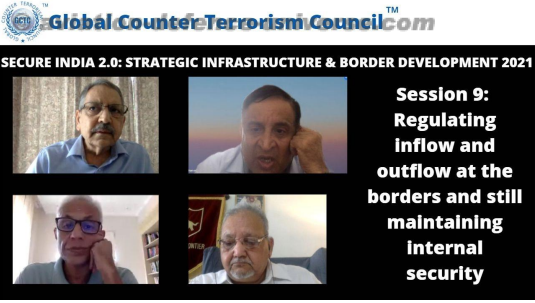
The tenth panel discussion was on Countering internal security challenges at the borders with emphasis on Air surveillance and monitoring, Integrated and Jointness for border areas in Jammu and Kashmir, Arunachal Pradesh, Manipur and SAARC’s significance in managing the borders, which was chaired by Vikram Singh, IPS(Retd), Former DGP, Uttar Pradesh. The panel consisted of eminent speakers like Brig Vinod Dutta, VSM, Army Veteran; Group Capt Anupam Banerjee VSM (Retd), Former Spokesperson, Indian Air Force; B.N. Sharma, Former IG, BSF; Krishan Varma, Former Special Secretary(Cab.Sectt.), GoI; Dr. Nafees Ahmad, Faculty of Legal Studies, South Asian University and Dr. Pavithran Nambiar, Senior Faculty, School of Police Science & Security Studies, NFSU. Although the speakers approached the topic from varied perspectives, they concurred on the fact that border security and border management has evolved and become more complex. To tackle the challenges, the speakers proposed investments in new technology and the need to research low cost solutions and indigenization of the technology.
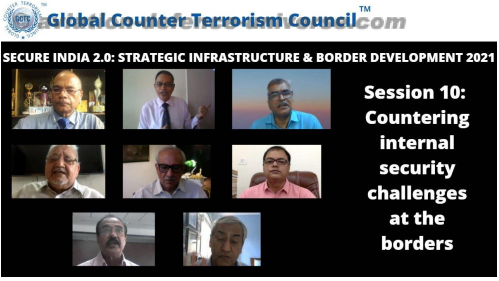
The Vote of thanks was presided over by Lt Gen Suresh Sharma, AVSM (Retd), Former Engineer In Chief & Former DG-Border Roads Organization who had summarized the key takeaways from the conference.































